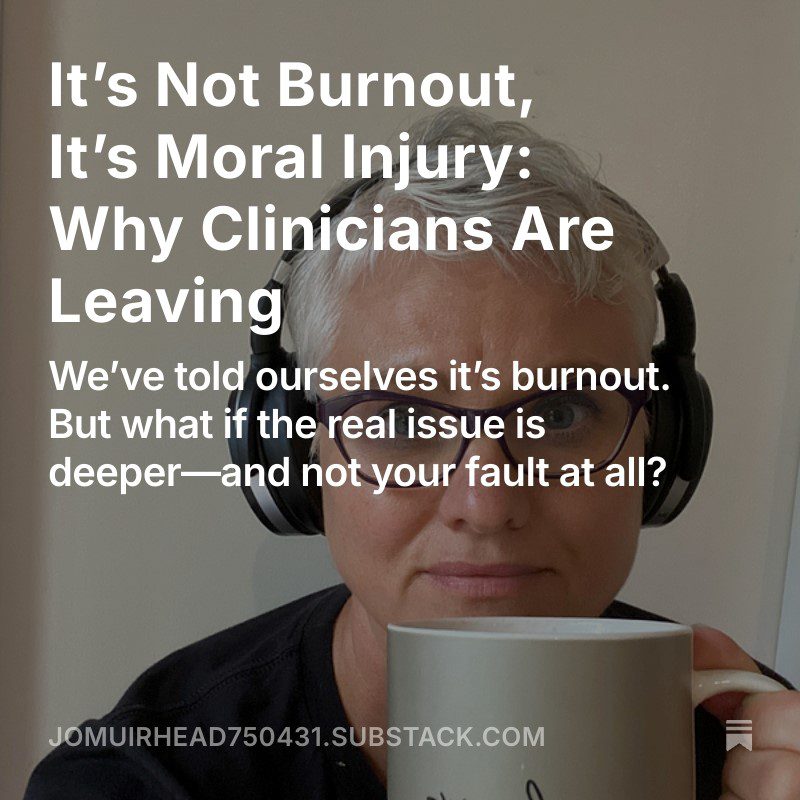For years, we’ve told ourselves we’re just tired. Overwhelmed. A bit crispy around the edges. The language of burnout has dominated our professional supervision, training sessions, and team meetings. And while burnout is real, it’s not the full story.
There’s something else at play. Something deeper.
It’s called moral injury.
When I set out to create Season 4 of The Entrepreneurial Clinician podcast, my goal was to progress the conversation about burnout. I’ve been hearing the same talking points since I was a baby health professional—self-care, time off, resilience—as if we haven’t been doing those things already.
But what I hadn’t expected was the depth of insight that emerged through the lived experiences clinicians shared with me from around the world.
One of the biggest takeaways from this season—for me personally—was learning about moral injury. It was an aha moment. A naming of the silent, insidious erosion I’d felt for years. Hosting the podcast, and later watching the documentary Shattered, helped me put into words what I hadn’t been able to articulate in nearly three decades of practice.

_________________________________________
What Is Moral Injury?
Moral injury was first studied in military settings, referring to the psychological and emotional harm that occurs when someone perpetrates, fails to prevent, or witnesses actions that contradict their moral beliefs (Litz et al., 2009).
In healthcare, moral injury occurs when clinicians are:
- Prevented from providing the care they know is right
- Forced to comply with policies or funding decisions that conflict with best practice
- Expected to prioritise systems over people
Dr. Wendy Dean and Dr. Simon Talbot brought this concept into the healthcare space, arguing that what many physicians and health professionals are calling burnout is in fact moral injury—a systemic betrayal of clinicians’ core values (Dean & Talbot, 2019).
_________________________________________
How It Shows Up
Think about the last time you had to fight tooth and nail to justify an essential piece of equipment for a client. A larger bed for pressure relief. A swallowing assessment to prevent aspiration. A continence aid to maintain dignity.
You know these things are vital. But the system demands more. More evidence. More justification. More forms. All the while, your client waits. Or declines. Or gives up.
In this moment, you’re not just tired. You’re morally injured.
You’re being asked to choose between:
- Your duty of care
- And a system that blocks that care
You feel the weight of responsibility, but have no authority. And that dissonance can erode not just your job satisfaction, but your sense of self.
_________________________________________
Burnout vs Moral Injury
| Burnout | Moral Injury |
|---|---|
| Caused by chronic workplace stress | Caused by ethical violations/systemic betrayal |
| Symptoms include exhaustion, detachment | Symptoms include guilt, shame, anger, disillusionment |
| Can be improved with time off, rest | Requires structural change, ethical repair |
A clinician experiencing burnout may need a break. A clinician experiencing moral injury needs a system that stops asking them to trade their ethics for compliance.
_________________________________________
A Systemic Problem With Personal Consequences
As Minky VanderWalt shared in our recent Entrepreneurial Clinician podcast episode, moral injury isn’t about personal failure—it’s about being ethical, compassionate, and competent in a system that doesn’t let you work that way. It’s a “death by a thousand cuts” (Dean, 2023).
This rings painfully true in systems like the NSW workers compensation scheme, or in NDIS-funded care, where clinicians are routinely asked to justify the obvious, delay necessary supports, or write reports that feel like performance theatre.
Add to that the recent strike by NSW psychiatrists—highlighting under-resourcing, unequal pay, and unsafe workloads—and it’s clear that our health systems are asking more of their people than is reasonable or ethical.
_________________________________________
Why This Matters Now
Clinicians don’t always care what happens to them – we’re used to self-sacrifice. But what if our moral injury is harming the very people we’re trying to help?
When we’re:
- Emotionally numbed
- Ethically compromised
- Spiritually depleted
…we can’t show up the way our clients need us to. And we start leaving the work. Quietly. Permanently.
_________________________________________
What Can We Do?
- Name it – Start talking about moral injury as something distinct from burnout.
- Validate each other – Share the moments that feel wrong, and know you’re not alone.
- Build safer systems of work – In teams, supervision, and leadership, invite ethical reflection and collective care.
- Push back together – If the system is the problem, collective advocacy has to be part of the solution.
_________________________________________
Final Thoughts
You’re not broken. You’re working in systems that often ask you to compromise your ethics just to keep going.
Let’s stop calling it burnout when what we’re really experiencing is betrayal.
_________________________________________
References:
Dean, W., & Talbot, S. (2019). Physician Burnout Is Not Resilience Deficit. It’s Moral Injury. STAT News.
Litz, B. T., et al. (2009). Moral injury and moral repair in war veterans: A preliminary model and intervention strategy. Clinical Psychology Review, 29(8), 695-706.
Dean, W. (2023). If I Betray These Words: Moral Injury in Medicine and Why It’s So Hard for Clinicians to Put Patients First. Steerforth.
The Entrepreneurial Clinician Podcast Episode 61 Beyond Burnout: Healing Moral Distress in Healthcare – Interview with Minky Van Der Walt
Shattered Training Series – https://www.shattereddoco.com/moral-injury-training

